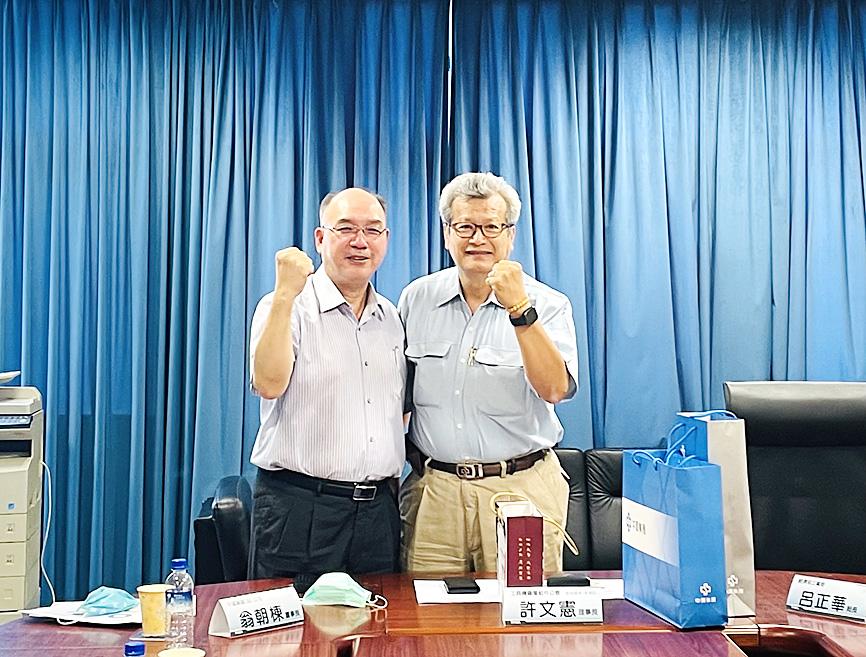China Steel Corp (CSC, 中鋼), Taiwan’s biggest steelmaker, yesterday said it would keep prices in the domestic market unchanged next month, despite surges in raw material prices, including iron ore and coking coal.
Prices for iron ore and coking coal exceed US$200 per tonne, with coal having doubled its price since January, the company said in a statement.
However, considering a local COVID-19 outbreak and local downstream firms’ competitiveness, the company said it would focus on stabilizing steel prices and encouraging a steady development of the market.

Photo courtesy of the Taiwan Association of Machinery Industry
“We’ve held prices steady for August so businesses do not have to fret about their orders,” CSC said. “We hope that domestic steel-dependent businesses can work together ... and take this opportunity to plan their future production accordingly.”
International demand for steel is likely to remain strong, with the IMF forecasting global economic growth to exceed 6 percent this year for the first time since the 1970s, CSC said.
“The global supply of steel is tight, and we expect that trend to continue in the second half of this year,” the company said.
At an online conference on Taiwan’s steel market, the Taiwan Association of Machinery Industry (TAMI, 台灣機械公會) urged CSC to ensure order in the domestic market by regulating downstream resellers.
“About 90 percent of our members buy steel from resellers, but the prices can be extremely chaotic. That proves that resellers are hoarding and price-gouging,” TAMI secretary-general Hsu Wen-tung (許文通) said yesterday, following a meeting with CSC chairman Wong Chao-tung (翁朝棟) on Tuesday.
The association called for more transparency in the steel market, urging the creation of a platform to connect sellers and buyers, and a quota for direct purchases with CSC.
CSC said that it is open to discussion on a matchmaking platform, but that direct quotas might be difficult to implement, as steel products often require processing by third parties.
However, CSC is keeping track of resellers’ stock levels, it said, adding that it would give the TAMI access to its data to make the market more transparent.

SETBACK: Apple’s India iPhone push has been disrupted after Foxconn recalled hundreds of Chinese engineers, amid Beijing’s attempts to curb tech transfers Apple Inc assembly partner Hon Hai Precision Industry Co (鴻海精密), also known internationally as Foxconn Technology Group (富士康科技集團), has recalled about 300 Chinese engineers from a factory in India, the latest setback for the iPhone maker’s push to rapidly expand in the country. The extraction of Chinese workers from the factory of Yuzhan Technology (India) Private Ltd, a Hon Hai component unit, in southern Tamil Nadu state, is the second such move in a few months. The company has started flying in Taiwanese engineers to replace staff leaving, people familiar with the matter said, asking not to be named, as the

The prices of gasoline and diesel at domestic fuel stations are to rise NT$0.1 and NT$0.4 per liter this week respectively, after international crude oil prices rose last week, CPC Corp, Taiwan (台灣中油) and Formosa Petrochemical Corp (台塑石化) announced yesterday. Effective today, gasoline prices at CPC and Formosa stations are to rise to NT$27.3, NT$28.8 and NT$30.8 per liter for 92, 95 and 98-octane unleaded gasoline respectively, the companies said in separate statements. The price of premium diesel is to rise to NT$26.2 per liter at CPC stations and NT$26 at Formosa pumps, they said. The announcements came after international crude oil prices

DOLLAR SIGNS: The central bank rejected claims that the NT dollar had appreciated 10 percentage points more than the yen or the won against the greenback The New Taiwan dollar yesterday fell for a sixth day to its weakest level in three months, driven by equity-related outflows and reactions to an economics official’s exchange rate remarks. The NT dollar slid NT$0.197, or 0.65 percent, to close at NT$30.505 per US dollar, central bank data showed. The local currency has depreciated 1.97 percent so far this month, ranking as the weakest performer among Asian currencies. Dealers attributed the retreat to foreign investors wiring capital gains and dividends abroad after taking profit in local shares. They also pointed to reports that Washington might consider taking equity stakes in chipmakers, including Taiwan Semiconductor

A German company is putting used electric vehicle batteries to new use by stacking them into fridge-size units that homes and businesses can use to store their excess solar and wind energy. This week, the company Voltfang — which means “catching volts” — opened its first industrial site in Aachen, Germany, near the Belgian and Dutch borders. With about 100 staff, Voltfang says it is the biggest facility of its kind in Europe in the budding sector of refurbishing lithium-ion batteries. Its CEO David Oudsandji hopes it would help Europe’s biggest economy ween itself off fossil fuels and increasingly rely on climate-friendly renewables. While